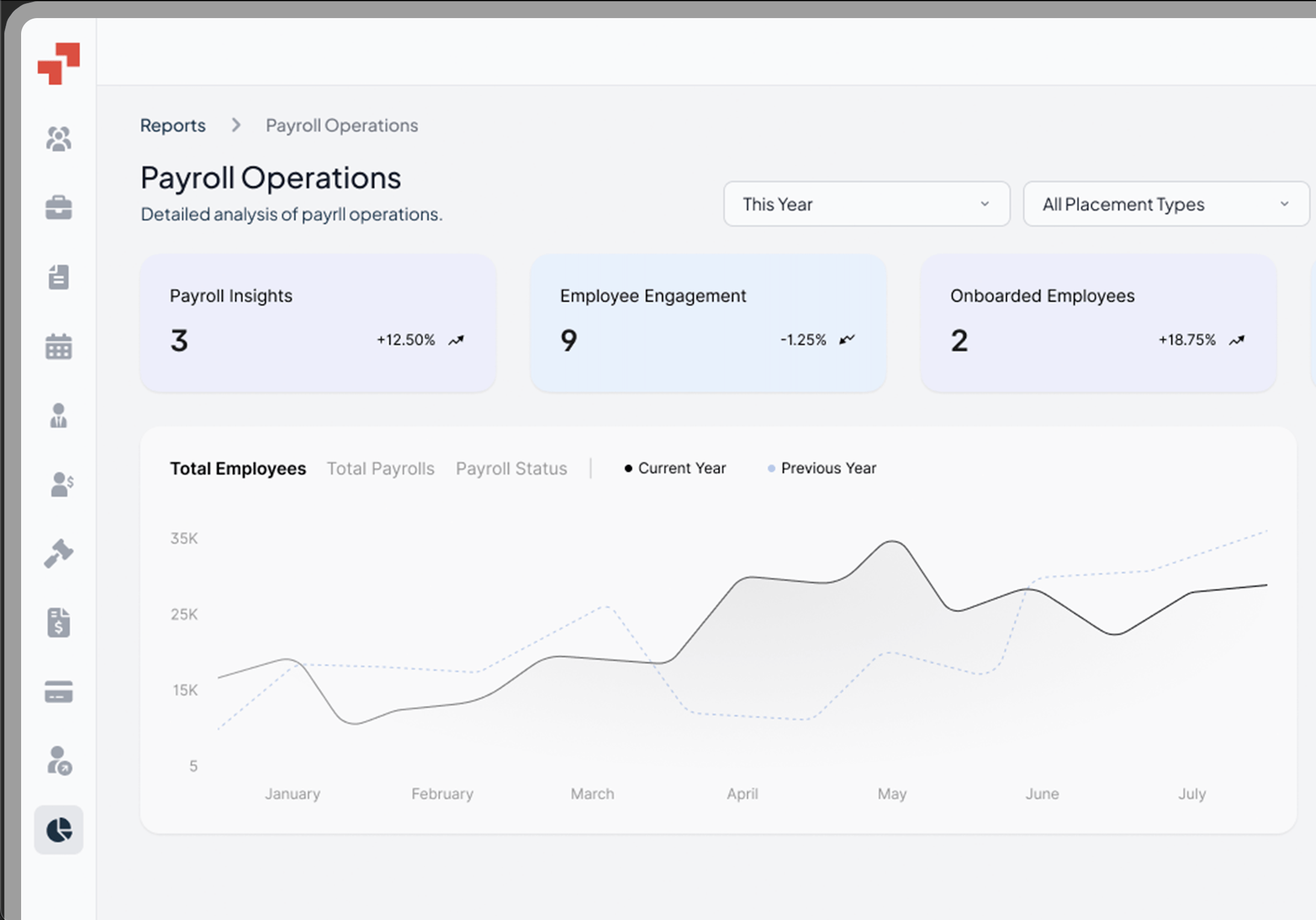Global Workforce GlossaryInternational Employment
Related Terms
Global Employment
Employment Agreement
International Employment Law
Employer of Record
Global Mobility
In today’s globalized economy, companies are no longer limited to local talent. International employment gives businesses the ability to employ staff internationally, enabling them to overcome regulatory and operational constraints, hire skilled professionals in foreign countries, expand their operations, and access diverse perspectives without setting up legal entities abroad.
With the right strategies, tools, and partners like PamGro, organizations can navigate cross-border compliance, payroll, and employment regulations smoothly while scaling globally.
Table of Contents
- What is co-employment?
- What are co-employment laws?
- Why is co-employment a risk?
- What are co-employment rules
- Co-employment do’s and don’ts
- How does co-employment work?
- What is the difference between co-employment and joint employment?
- Co-employment vs PEO
- Co-employment vs employee leasing
- Is co-op considered a full-time employee?
- Is it illegal to work for two jobs in the same industry?
- Co-employment examples
- Practical Case Study Example
- PamGro and Co-employment: Your Global Partner
What is International Employment?
International employment is the practice of hiring employees who work in a country different from the company’s headquarters. It enables organizations to tap into global talent pools and maintain operational efficiency without establishing a physical presence in each location.
Eligibility for international employment often depends on the legal status of individuals, such as citizens, permanent residents, or local citizens, which can affect work authorization and legal rights.
Expanding on this, international employment can include remote roles, expatriate positions, or cross-border hiring via Employer of Record (EOR) services. Companies must meet specific criteria, such as ensuring proper work authorization and compliance with local laws, when hiring internationally. Organizations need to determine the most suitable employment model based on assignment details, legal requirements, and operational needs. It is also important to identify the right employment option for each situation to ensure compliance and efficiency. Each employment model is suited to different types of positions within the organization. Companies benefit from diverse skill sets, cultural insights, and access to international markets while staying compliant with foreign employment regulations.
Brief About International Employment Law
International employment law governs how employees can work across borders, covering work permits, contracts, labor rights, taxes, and benefits. Companies must comply with the legal frameworks of the employee’s country to avoid fines or disputes. Various departments within an organization are responsible for ensuring compliance with international employment laws and regulations.
This law varies by country, so businesses must understand local labor standards, taxation requirements, and social security obligations. It is important for departments to regularly review legal requirements and compliance obligations when hiring internationally to ensure they remain responsible for meeting all necessary standards.
For example, hiring an employee in Germany requires adherence to German labor codes, including statutory benefits and termination rules (U.S. Department of Labor). Partnering with an EOR like PamGro simplifies compliance, as they manage these obligations efficiently
How Does International Employment Work?
International employment operates through multiple models: direct hiring via local entities, contracting freelancers, or using EOR services. Employees can be hired as direct hires, expatriates, or local nationals, depending on the employment arrangement and the criteria set by the organization. The chosen model depends on legal requirements, operational strategy, and employee location.
Direct employment requires establishing a local subsidiary, while independent contracting allows remote engagement without entity setup. EOR solutions serve as the legal employer for international staff, managing payroll, taxes, and compliance.
Staffing abroad involves complex legal and HR considerations, making proper coordination essential to ensure compliance and smooth operations. This makes hiring abroad faster, less risky, and scalable, especially for startups or companies exploring global markets.
What Jobs Let You Work Internationally?
Jobs in technology, finance, consulting, healthcare, education, and creative industries often offer international employment opportunities. These roles provide the opportunity for professionals to gain international experience and advance their careers within supportive environments. Roles can be remote, hybrid, or involve relocation to a foreign country.
Global demand is particularly high for software developers, project managers, digital marketers, data analysts, and specialized consultants. Engaging in diverse work duties in these positions helps professionals enhance their skills and experience. Conducting a job search on global platforms is a key step in securing international employment. Remote-first companies and multinational corporations increasingly hire across borders, leveraging cross-border employment solutions to maintain compliance and productivity.
What is an International Workforce?
An international workforce is a team of employees working in multiple countries for a single organization. This workforce allows businesses to operate globally, tap into diverse markets, and enhance innovation through cultural and professional diversity.
Managing an international workforce requires global HR solutions, international payroll services, and knowledge of labor regulations. Companies must address challenges like time-zone coordination, cultural differences, employee engagement, and legal compliance to ensure smooth operations. It is essential to clearly define the duties of each employee to delineate responsibilities and expectations across different locations. Careful planning is also crucial to address legal, tax, and compliance challenges when managing a global workforce.
How to Find Companies That Hire Internationally?
To find international employment opportunities, explore multinational companies, remote-first startups, NGOs, and global recruitment platforms. LinkedIn, Indeed, and Glassdoor often list remote international jobs. When seeking employment opportunities overseas, it is important to understand visa sponsorship requirements and the specific processes involved in working abroad.
Networking through professional communities or global job boards is also effective. Many international employment opportunities are tied to specific projects or programs, each with unique legal and logistical requirements. Companies that hire internationally typically have cross-border hiring solutions or EOR partnerships. PamGro helps organizations connect with global talent and ensures seamless onboarding, compliance, and payroll for international hires.
Role of International Organizations in International Employment
International organizations, such as the United Nations, play a pivotal role in shaping and supporting international employment across the globe. With offices in key cities like Geneva, the United Nations Office works to foster cooperation between countries, helping employers and employees navigate the complexities of working abroad. These organizations provide essential guidance on visa requirements, employment laws, and social security benefits, ensuring that the process of hiring and managing international employees is both legal and efficient.
For employers, the United Nations and similar organizations offer resources to better understand the legal frameworks and benefits systems in different countries, making it easier to comply with local regulations. Employees working abroad can also benefit from the support and information provided by these offices, such as advice on adapting to new environments, understanding local laws, and accessing benefits.
By promoting international understanding and streamlining employment processes, international organizations help create a more connected and effective global workforce.
Alternative Employment Arrangements in the Global Workforce
The global workforce is rapidly evolving, with alternative employment arrangements like remote work and freelance contracts becoming increasingly common. These flexible models allow employees to work from virtually any location in the world, whether it’s a bustling city like New York or a tropical destination like Costa Rica. For employers, this opens up access to talent in multiple countries, but it also introduces new factors to consider, such as local tax laws, visa requirements, and work location regulations.
When hiring internationally, employers must understand the legal and tax implications in both their own country and the employee’s location. For example, a company in New York hiring a freelancer based in Costa Rica must ensure compliance with Costa Rican employment and tax laws, as well as any relevant visa requirements. By thoroughly researching and understanding these factors, employers can create effective global employment strategies that maximize flexibility while minimizing legal risks for both the company and its employees.
Education and Training for International Careers
Success in international careers depends heavily on education and training that equip employees with the right skills to thrive abroad. Universities and organizations around the world offer specialized programs for students and professionals seeking to expand their global career opportunities. These may include courses in international business, language training, cultural adaptation, and global marketing.
For instance, a student aiming to work in London might enroll in international business or finance programs to gain the skills needed for the city’s competitive job market. Employers can also play a crucial role by providing ongoing training and development opportunities for their international employees, such as mentorship programs, workshops, and access to global conferences. By investing in education and training, both employers and employees can ensure they are prepared to meet the challenges of working abroad and can take full advantage of international employment opportunities.
Languages and Cultural Adaptability
Language proficiency and cultural adaptability are essential skills for employees working abroad. Effective communication with local colleagues, clients, and partners is crucial for success in any international employment setting. For example, an employee relocating to Mexico may benefit from Spanish language courses and cultural orientation programs to better integrate into the local work environment.
Employers can support their international employees by offering language training, cultural briefings, and access to expatriate networks. These resources help employees adapt to new customs, business practices, and social norms, making it easier to build strong relationships and navigate the complexities of working in a foreign country. By prioritizing language skills and cultural adaptability, both employers and employees can enhance their effectiveness and achieve greater success in the global workforce.
Overview of International Employment Strategies
Successful international employment strategies align hiring with business expansion goals while ensuring compliance. This includes choosing the right model (EOR, subsidiary, contractor), understanding labor laws, and implementing structured global workforce management processes. When developing employment strategies, companies should consider the length of international assignments or projects, as duration can impact the selection of staffing options and legal requirements.
Companies should also plan for international payroll, employee onboarding, benefits management, and legal obligations to avoid costly mistakes. Clear strategies reduce risks, improve retention, and allow businesses to scale efficiently across multiple countries
International Employment Guidelines Eligibility
Eligibility for international employment depends on work permits, visas, and country-specific employment laws. Employees must meet these requirements before they can legally work abroad.
Applicants must have completed the necessary education or training to be eligible for international employment. In addition, a valid social security number may be required for employment and payroll processing in certain countries.
For example, hiring a Canadian citizen in the U.S. requires a valid work visa. Employers should also verify qualifications, certifications, and compliance with local labor laws. EOR services like PamGro manage these eligibility requirements and facilitate smooth cross-border hiring.
International Employment Legal Obligations
Employers have legal obligations when hiring internationally, including adhering to labor laws, paying taxes, providing statutory benefits, and maintaining employment contracts. Note: It is important to pay attention to specific legal or regulatory criteria in each country, as employers are responsible for compliance with local employment regulations.
Failing to comply can result in penalties, fines, or legal disputes. Organizations must understand foreign employment regulations, social security requirements, and payroll obligations. With EOR solutions, companies can manage these legal responsibilities efficiently while focusing on business growth.
Importance of International Employment
International employment enables access to global talent, improves diversity, drives innovation, and supports business expansion without the cost of establishing foreign entities. Additionally, international employment offers significant financial benefits and opportunities to make money, making these roles attractive for both organizations and employees.
It also helps companies respond quickly to market changes, operate across time zones, and maintain competitive advantage. For startups and SMEs, partnering with EOR providers like PamGro can accelerate international hiring while mitigating compliance risks. These arrangements benefit both the organization and the person hired, as they provide flexibility and access to new opportunities. The university also plays a key role in supporting international employment initiatives by establishing policies, legal frameworks, and partnerships to facilitate global hiring
What are the Challenges in International Employment
International employment brings a unique set of challenges for both employers and employees. Navigating complex labor laws, visa requirements, and tax regulations in a foreign country can be daunting. Employers must carefully consider factors such as employment contracts, paid benefits, and compliance with local laws to ensure a smooth hiring process and ongoing employment relationship.
Employees working abroad may face personal challenges, including homesickness, cultural shock, and adapting to new work environments. To address these issues, employers can offer comprehensive support, such as relocation assistance, language training, and access to employee networks. Providing benefits like health insurance, retirement plans, and paid time off can also help attract and retain top international talent. By understanding the unique challenges of international employment and proactively supporting their employees, employers can create a more inclusive, resilient, and successful global workforce, while opening up new opportunities for career growth and development.
An Example on International Employment
A U.S. SaaS company wants to hire a developer in India. Instead of forming an Indian subsidiary, it partners with PamGro as an EOR. PamGro handles payroll, taxes, benefits, and compliance. The developer is hired to perform specific duties, which may include research or project-based work as part of their international employment. The developer starts work remotely, and the company gains access to international talent quickly and legally. This approach saves time, reduces operational costs, and ensures full legal compliance.
Practical Case Study
Expanding into Europe Seamlessly
A U.S.-based marketing firm aimed to hire five specialists across Germany, France, and Spain. Setting up separate entities in each country would have taken months and significant investment. Instead, the firm partnered with PamGro. This partnership enabled close collaboration between the firm’s departments and PamGro to efficiently manage international employment arrangements for their new hires.
PamGro acted as the legal employer in each country, managing contracts, payroll, tax compliance, and employee benefits. Within weeks, the company onboarded all employees, ensuring adherence to local labor laws. Productivity remained high, and employees felt supported with structured onboarding and benefits.
The firm expanded its European presence without investing in local offices, avoided legal risks, and scaled operations rapidly. By leveraging an EOR, global hiring became efficient, compliant, and cost-effective.
PamGro : You Trusted partner for Seamless Global Expansion
PamGro empowers businesses to hire internationally without the complexities of local entities. Our international employment services, including cross-border hiring solutions, payroll management, compliance support, and employee onboarding, allow companies to focus on growth while we handle the administrative and legal intricacies. Explore our Global Employment Solutions to hire global talent quickly and securely.
Hire the Best Talent, Anywhere






